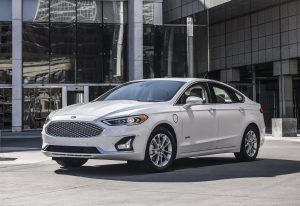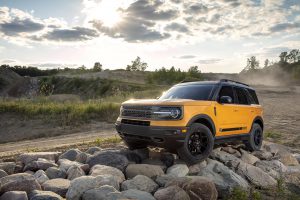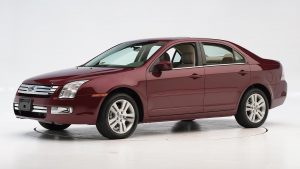
The 2020 Ford Fusion carries forward sleek, modern styling with, hybrid and plug-in hybrid capability. And now it’s dead.
An era came to an end last week with little fanfare or even real recognition: Ford Motor Co. produced its last Fusion midsize sedan, essentially completing its shift away from sedans in its product line-up.
The Dearborn, Michigan-based automaker didn’t play up the move and, ironically enough, it was overshadowed by the announcement of current CEO Jim Hackett’s retirement — Hackett being the man who elected to cut sedans from the company’s portfolio to focus solely on selling more popular and profitable utility vehicles and trucks.
Ford’s last Fusion rolled off the line at its Hermosillo, Mexico plant July 31, making it the last Ford sedan for the foreseeable future. The automaker previously ended production on the Fiesta, Focus and Taurus. While it’s not the last sedan in the entire company’s line-up, the Continental is still being produced at its Flat Rock, Michigan facility, it’s the last one that sold in volume.
(The Ford Fusion is dead — for now anyway.)
Introduced in 2006, the second-gen version showed up in 2013, and the following year Fusion sales hit their peak with more than 306,000 units sold. However, sales have been on the decline since then. Through the first half of the year, Ford sold 61,421 Fusions, down 36.3 percent.
Not surprisingly, that production availability will be taken over by … the new Ford Bronco Sport, which will begin volume production in September. Some have been critical of the automaker’s move out of the segment, noting that it still accounts for 4 million vehicle sales annually.
In fact, other automakers, notably Toyota, have repeatedly expressed and confirmed their commitment to remain in the segment. Toyota’s seemingly doubled down on the sedan segment, upgrading its Corolla, Camry and Avalon with available all-wheel drive as well as applying its sporty TRD treatment to the sedans as well.
They done this while essentially wishing Ford and other domestic makers well in their endeavor to fight with one another even more in the truck and utility vehicle segments. And Ford will be doing exactly that as its Detroit-based rivals, General Motors and Fiat Chrysler, have been on a similar product development – or disposal, if you will – arc, cutting sedans from their brand offerings as well.
(2019 Ford Fusion to be the “most sophisticated” sedan ever.)
Just a few months ago, Chevrolet saw the last Impala roll off the line at its Detroit-Hamtramck Assembly Plant. The Impala has six decades of history as part of the brand’s portfolio. However, it was shown the door – not even remaining as an option for rental fleets – as the company retools the plant to produce electric vehicles, starting with the much-hyped GMC Hummer pickup.

The all-new Bronco Sport will be taking the Fusion’s place on the assembly line at Ford’s Hermosillo, Mexico plant.
Prior to the Impala, the company ended production on the Chevy Volt, the brand’s first volume-selling electric sedan, some would say cut too soon as it was a good product with reasonable sales numbers. But it’s a sedan and that’s not in the plans.
General Motors announced the end of the run for the Impala and an assortment of other passenger vehicles in November 2018 – part of a broader plan to close a group of U.S. plants to address excess capacity. One only has to look at the sales charts to understand. Where sedan once ruled the roads, 52% of the new vehicles sold in the U.S. last year were SUVs and CUVs, with pickups and vans bringing the light truck segment, overall, up to around 70 percent.
Chevy has also killed off the smaller Cruze sedan and the Buick LaCrosse, and other models, such as the Cadillac CT6, have followed, with that production capacity either eliminated, i.e. the Cruze with the closure and subsequent sale of the Lordstown, Ohio plant that produced, or realigned within GM’s plans to build EVs or more trucks and utes.
(End of the run: The last Chevy Impala rolls off the line.)
Fiat Chrysler Automobiles hasn’t gone whole hog on the idea, although it has dropped such models as the Chrysler 200, with only a handful of niche models left, such as the Dodge Challenger and Charger muscle cars. Fast-falling sales of the big Chrysler 300 raise questions about its fate, as well.


The Big 3 will regret the decision to abandon cars to the Japanese, Koreans, Brits and Germans. Someday gas prices will rise and people will want cars and when they roll they’re American made SUVs and trucks back to the dealership to trade them in and find out there are no more cars the Big 3 will lose those customers, maybe forever.
So throwing away billions of dollars on re-designing sedans for a dying market is a regretful decision? Who knew?